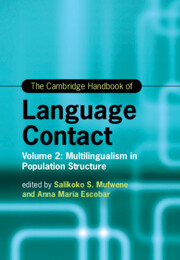Book contents
- The Cambridge Handbook of Language Contact
- Cambridge Handbooks in Language and Linguistics
- The Cambridge Handbook of Language Contact
- Copyright page
- Contents
- Maps Volume II
- Figures Volume II
- Tables Volume II
- Contributors
- Preface
- Introduction
- Part One Multilingualism
- Part Two Contact, Emergence, and Language Classification
- Part Three Lingua Francas
- Part Four Language Vitality
- Part Five Contact and Language Structures
- 22 Structural Outcomes of Language Contact
- 23 The Emergence of Andean Spanish: Against the Odds
- 24 Contact between English and Norman in the Channel Islands
- Author Index
- Language Index
- Subject Index
- References
24 - Contact between English and Norman in the Channel Islands
from Part Five - Contact and Language Structures
Published online by Cambridge University Press: 02 June 2022
- The Cambridge Handbook of Language Contact
- Cambridge Handbooks in Language and Linguistics
- The Cambridge Handbook of Language Contact
- Copyright page
- Contents
- Maps Volume II
- Figures Volume II
- Tables Volume II
- Contributors
- Preface
- Introduction
- Part One Multilingualism
- Part Two Contact, Emergence, and Language Classification
- Part Three Lingua Francas
- Part Four Language Vitality
- Part Five Contact and Language Structures
- 22 Structural Outcomes of Language Contact
- 23 The Emergence of Andean Spanish: Against the Odds
- 24 Contact between English and Norman in the Channel Islands
- Author Index
- Language Index
- Subject Index
- References
Summary
The sociolinguistic situation of the Channel Islands has meant that English has been spoken there alongside the native language, Norman, for several centuries, albeit in a diglossic relationship, with English assuming “High” functions (administration, legislation, education, media, and so forth) and Norman “Low” functions (familiar discourse with family and friends). The fact that, today, all speakers of the three extant varieties of Insular Norman (Jèrriais, Guernesiais, and Sercquiais) are also fluent in English has had far-reaching linguistic consequences in that the Norman spoken in the Channel Islands has diverged from the varieties spoken on the French mainland, and distinctive local varieties of Channel Island English have developed. Based on original data, this chapter provides an overview of the sociolinguistic setting that gave rise to this language contact and discusses some representative examples of contact-induced influence in the lexis, phonology, and morphosyntax of both Channel Island Norman and Channel Island English.
Keywords
- Type
- Chapter
- Information
- The Cambridge Handbook of Language ContactVolume 2: Multilingualism in Population Structure, pp. 635 - 654Publisher: Cambridge University PressPrint publication year: 2022

